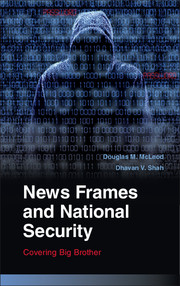Introduction
News, National Security, and Civil Liberties
Published online by Cambridge University Press: 18 December 2014
Summary
“After September the eleventh, I vowed to the American people that our government would do everything within the law to protect them against another terrorist attack. As part of this effort, I authorized the National Security Agency to intercept the international communications of people with known links to al Qaeda and related terrorist organizations. In other words, if al Qaeda or their associates are making calls into the United States or out of the United States, we want to know what they’re saying.”
– President George W. Bush May 11, 2006“Last December, the Times reported that the N.S.A. was listening in on calls between people in the United States and people in other countries, and a few weeks ago USA Today reported that the agency was collecting information on millions of private domestic calls.…The N.S.A. began, in some cases, to eavesdrop on callers (often using computers to listen for key words) or to investigate them using traditional police methods. A government consultant told me that tens of thousands of Americans had had their calls monitored in one way or the other.”
– Seymour M. Hersh The New Yorker May 22, 2006These opening statements reflect fundamental, yet opposing, concerns in what has been one of the most important postmillennial debates for American democracy, the tradeoff between protecting national security and defending civil liberties. Though this debate has been evident since the dawn of U.S. history, the terrorist attacks of September 11, 2001 raised its intensity to an unprecedented level, as the course of both foreign and domestic policy have been substantially altered. On the international front, these attacks led to protracted wars in Afghanistan and Iraq. On the home front, and central to the focus of this book, the Bush administration pushed the USA PATRIOT Act (officially titled the Uniting and Strengthening America by Providing Appropriate Tools Required to Intercept and Obstruct Terrorism Act) through Congress on October 25, 2001, substantially expanding the government’s surveillance powers in ways that were unimagined at the time of its inception. Since that time, the law has been reauthorized twice, first in July 2005 and again in May 2011, with the key provisions now extended until June 2015. This law thrust the debate to the center of the American political stage, as policymakers, activists, and citizens considered the steps taken to prevent another terrorist attack.
- Type
- Chapter
- Information
- News Frames and National SecurityCovering Big Brother, pp. 1 - 6Publisher: Cambridge University PressPrint publication year: 2014

